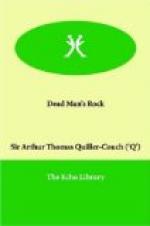“Right,” he answered coolly. “Quite right. Oh, the arts by which I enticed that man to drink and then to crime! Even now I could sit and laugh over them by the hour. Why, man, there was not a touch of guile in the fellow when I took him in hand, and yet it was he that afterwards took your father’s life. He tried it once in Bombay and bungled it sadly: he did it neatly enough, though, on the jib-boom of the Belle Fortune. I lent him the knife: I would have done it myself, but Railton was nearer; and besides it is always better to be a witness.”
What was that rustling sound behind the partition? Colliver did not hear it, at any rate, but went on with his tale, and though his eyes were dancing flames of hate his voice was calm now as ever.
“I had stolen half the clasp beforehand from the cabin floor where that stupendous idiot, Ezekiel Trenoweth, had dropped it. Railton caught him before he dropped, but I did not know he had time to get the box away, for just then a huge wave broke over us and before the next we both jumped for the Rock. I thought that Railton must have been sucked back, for I only clung on myself by the luckiest chance. It was pitch-dark and impossible to see. I called his name, but he either could not hear for the roar, or did not choose to answer, so after a bit I stopped. I thought him dead, and he no doubt thought me dead, until we met upon Dead Man’s Rock.
“Shall I finish? Oh, yes, you shall hear the whole story. After the inquest I escaped back to Plymouth, told Lucy that her husband had been drowned at sea, and finally persuaded her to leave Plymouth and marry me. So I triumphed there, too: oh, yes, I have triumphed throughout.”
“You hound!” I cried.
He laughed a low musical laugh and went on again—
“Ah, yes, you are angry of course; but I let that pass. I have one account to settle with you Trenoweths, and that is enough for me. Three times have I had you in my power, Mr. Jasper Trenoweth—three times or four—and let you escape. Once beneath Dead Man’s Rock when I had my fingers on your young weasand and was stopped by those cursed fishermen. Idiots that they were, they thought the sight of me had frightened you and made you faint. Faint! You would have been dead in another half-minute. How I laughed in my sleeve while that uncle of yours was trying to make me understand—me—what was my name then?—oh, ay, Georgio Rhodojani. However, you escaped that time: and once more you hardly guessed how near you were to death, when I looked in at the window on the night after the inquest. Why, in my mind I was tossing up whether or not I should murder you and your white-faced mother. I should have done so, but thought you might hold some knowledge of the secret after your meeting with Railton, so that it seemed better to bide my time.”
“If it be any satisfaction to you,” I interrupted, “to know that had you killed me then you would never have laid hands on that clasp yonder, you are welcome to it.”




